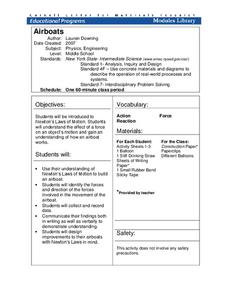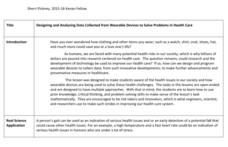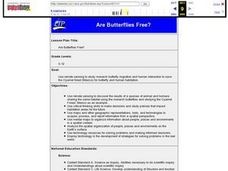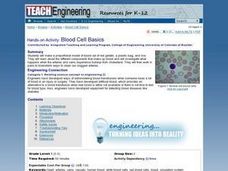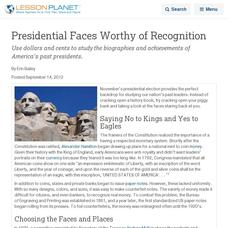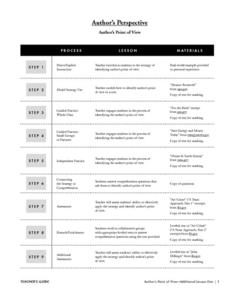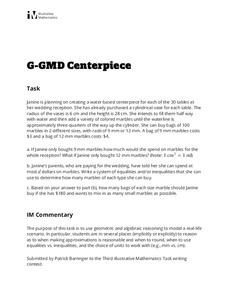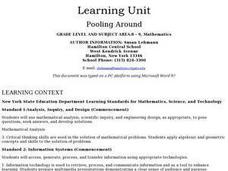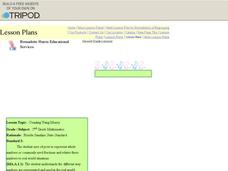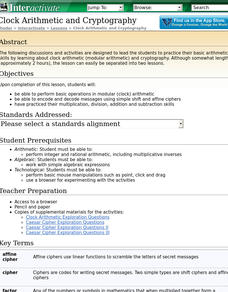Cornell University
Airboats
Don't let the resource blow you away. Scholars build airboats from basic materials and collect data on how far the boats move. They refine their designs taking Newton's laws into consideration.
Kenan Fellows
Designing and Analyzing Data Collected from Wearable Devices to Solve Problems in Health Care
Wearable devices have become more the norm than the exception. Learners analyze data from a sample device with a regression analysis in a helpful hands-on lesson. Their focus is to determine if there is a connection between temperature...
Curated OER
Are Butterflies Free?
Students use remote sensing to study monarch butterfly migration and human interaction to save the Oyamel forest (Mexico) for butterfly and human habitation.
Curated OER
Blood Cell Basics
Students design a proportional model of blood out of red gelatin, a plastic bag, and rice. They study the components that make up blood and investigate what happens when the arteries in different scenerios. They work in pairs in order to...
Curated OER
Personal Experience Narratives
Help your middle schoolers identify personal experience narratives in their own lives through telling stories themselves and from family members or other adults. They study personal experience narratives in Swapping Stories and compare...
Curated OER
Playground Mapping
Students convert their physical models of a playground from a previous lesson into a map of the playground that includes a scale and key. They examine and discuss examples of maps, view an image to map photo essay, and create a map using...
Curated OER
Men of Steel
Students explore early 20th century steel making. In this U.S. history steel making lesson, students view and describe a postcard and a picture depicting exaggerated aspects of the steel industry. Students listen to a poem...
Alabama Learning Exchange
Bloodstain Pattern Doesn't Lie......
An interesting instructional activity on hypothesizing about the diameter of a drop of blood that is splattered. To test their theories, learners work in groups to make blood droplets splatter from different heights. They use graphed...
Curated OER
Presidential Faces Worthy of Recognition
Using dollars and cents to study the biographies and achievements of America's past presidents.
Take 10
Author’s Perspective
Gradually build understanding of author's point of view through a scaffolded set of exercises. Moving from direct instruction, to collaborative work, and eventually to independent practice, these steps will assist your class in...
Illustrative Mathematics
Centerpiece
Learners hear wedding bells in this problem set, as they help a fictional bride plan the centerpieces for her wedding reception. Algebra is married to geometry as volume, aesthetics, and budgeting all come into play. Learners are...
University of Minnesota
Connect the Neurons!
Create a neuron frenzy as your pupils play the part of the neurons. An engaging instructional activity creates a human chain of neurons that pass cotton balls posing as neurotransmitters. Scholars learn about pre- and post-synapses...
Curated OER
Squares Have Roots?
Students define a square and connect this information to a square root. In this square root lesson, students make a chart listing square numbers and their roots.
Curated OER
Arithmetic: Place Value
Students explore the mathematical concept of place value. In this mathematics lesson, students use a question and answer format. The instructor clarifies the answers and possible mistakes as discussion takes place.
Curated OER
Pooling Around
Pupils complete a unit of lessons on computing area and volume. They play a Jeopardy game of basic area formulas, calculate surface area of shapes, develop a Powerpoint presentation, and conduct a simulation of finding the surface area...
Curated OER
Counting Using Money
Second graders count fake money by grouping like coins together. In this counting lesson plan, 2nd graders complete worksheets provided in this lesson.
Curated OER
Putting Your Best Foot Forward
Third graders measure their feet and their parents' feet, record data on computer-generated graphs, and calculate and record mean, median, and mode.
Curated OER
Fraction Equivalence
Fourth graders explore fractions. They compare different fractions using fraction bars. Students find equivalent fractions and they use fraction bars to visualize addition of fractions.
Pennsylvania Department of Education
Extending Pattern Understandings
Students use shapes and manipulatives to demonstrate patterns. In this patterns lesson plan, students also break up patterns to identify a pattern unit.
Curated OER
Perimeter Playground
Students explore geometry by participating in a school measuring activity. For this perimeter lesson, students discuss the techniques and methods used in order to measure a large perimeter or geometric figure. Students utilize grid...
Curated OER
Check It Out
Students discuss the many processes involved with personal banking. They create their own budget based on their career choices. They also practice balancing a checkbook.
Curated OER
Clock Arithmetic and Cryptography
Students investigate modular clock arithmetic and cryptography. They perform basic operations in modular (clock) arithmetic and encode and decode messages using simple shift and affine ciphers.
Curated OER
Clock Arithmetic and Cryptography
Learners explore the concept of modular arithmetic and cryptography. In this modular arithmetic and cryptography lesson, students use applets to explore modular arithmetic using a clock and Caesar Ciphers. Learners exchange their ciphers...
Curated OER
Means of Growth
Learners collect and graph data. In this statistics lesson, students analyze their plotted data using a scatter plot. They identify lines as having positive, negative or no correlation.


